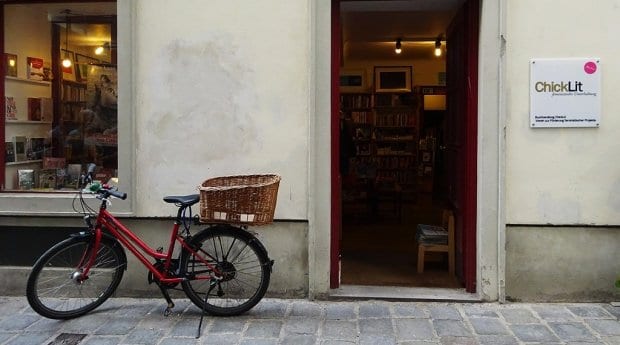
Vienna’s lesbian feminist bookstore, ChickLit. Credit: Keph Senett
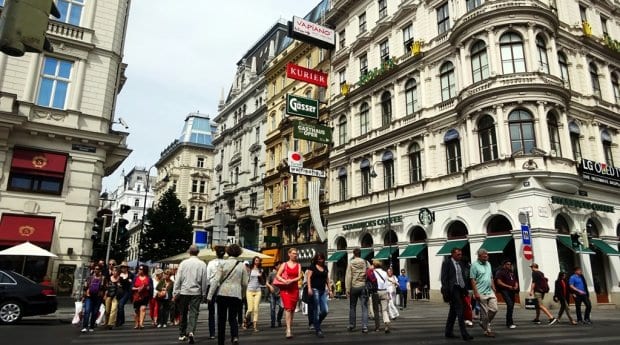
Shoppers tour busy District 1. Credit: Keph Senett
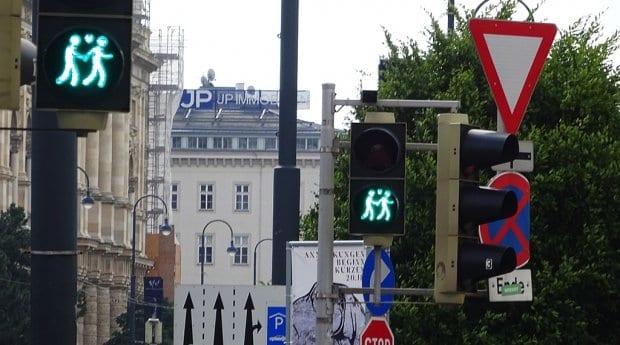
Vienna's “same-sex traffic lights” proved to be so popular that they will stay up permanently. Credit: Keph Senett
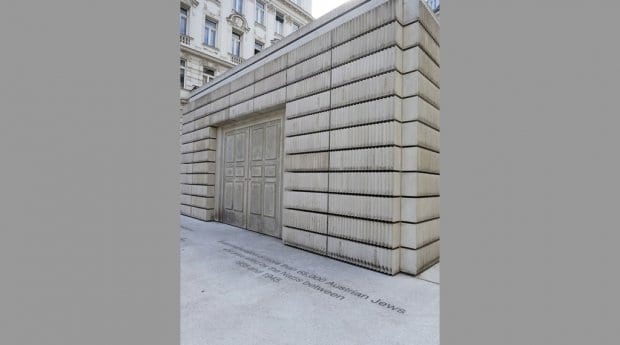
The Holocaust Memorial in Judenplatz, District 1. Credit: Keph Senett
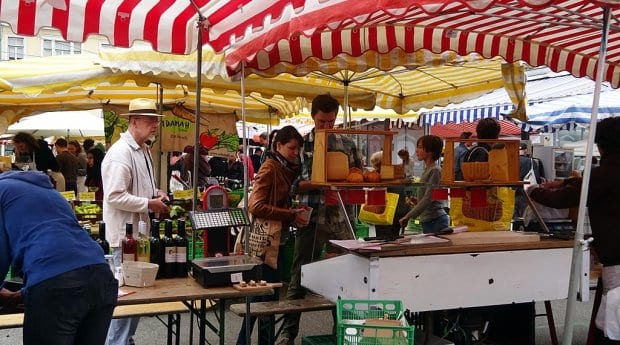
Shoppers at the Karmelitermarkt in District 2. Credit: Keph Senett
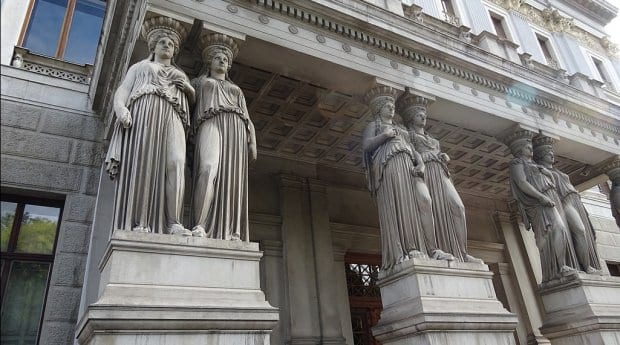
Women adorn the columns in front of the Austrian Parliament. Credit: Keph Senett
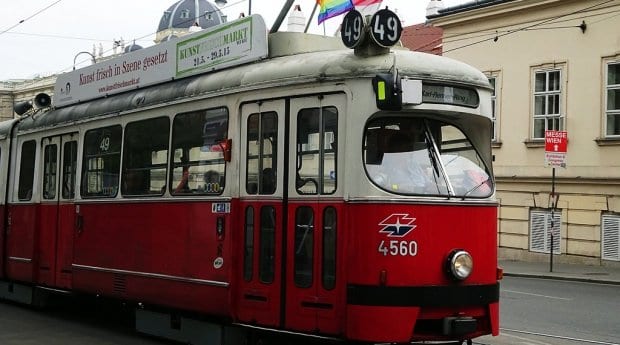
A tram sports rainbow and Austrian flags. Credit: Keph Senett
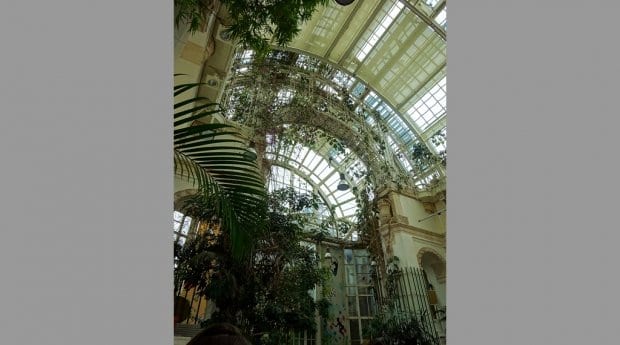
The Palmenhaus “greenhouse” beside the Imperial Palace. Credit: Keph Senett
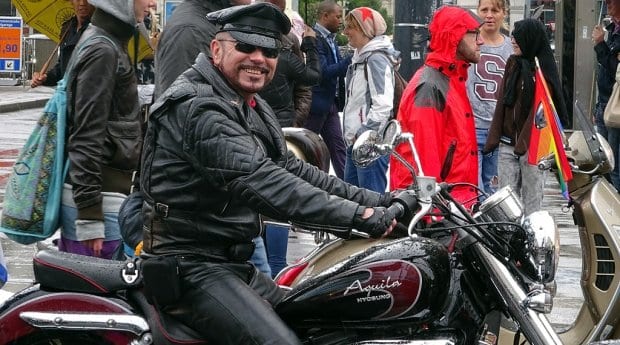
The rain hasn’t dampened this leatherman’s spirits. Credit: Keph Senett
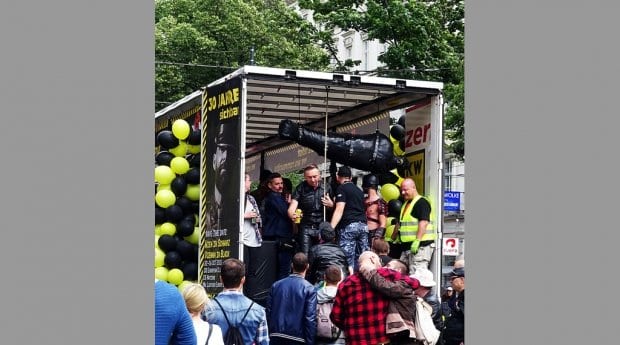
Spectators gather around the LMC Vienna fetish float. Credit: Keph Senett
In 2014, openly gay Austrian drag queen Conchita Wurst won the Eurovision Song Contest and, as an added bonus, offended Russian President Vladimir Putin with her entry, “Rise Like a Phoenix.” The song drew international attention to a country often overlooked, highlighting its culture of diversity and acceptance. As I learned on a four-day media tour hosted by Vienna Tourism in June 2015, although Conchita’s fame is new, the capital’s queer history goes back as far as the city itself.
The past and politics
Vienna has an extraordinary past, a history most often framed in light of World War II. During those years, Austria was contested, enduring military occupation and annexation, and evidence of this period can be found throughout the capital. It’s fascinating stuff for any visitor interested in politics and Europe’s past, and even more for those curious about queer lives. Within Vienna’s broader war story is a parallel history, one in which feminist historian Ines Rieder is expert. Associated with the gay and lesbian culture and history centre QWien (pronounced “queen”), Rieder guides historical city walks with a lesbian bent (ask for more information on gay and trans history).
It’s with Rieder that we first explore Vienna. Only steps from our door at the gracious and gorgeous Altstadt (a fabulous boutique art hotel located near the MuseumQuartier) we see our first sign of modern Viennese LGBT Pride: mounted on the front of a passing tram, a rainbow flag flutters next to an Austrian one. These will be on display for the entire month of June, Rieder says. She leads us to a nearby crosswalk where twin red figures light up the traffic signal. We cheer when the light turns green and a tiny heart appears between them. Same-sex traffic lights were installed throughout the city prior to the 2015 Eurovision Song Contest and intended to be temporary, but after an overwhelmingly positive response, city officials decided to keep them in place.
Vienna’s diversity campaign might be playful, but it’s not frivolous. During a tour of the Rathaus (City Hall) with Wolfgang Wilhelm of Vienna’s Anti-Discrimination Unit for Same-Sex Lifestyles (WASt), we learn that homosexuality was decriminalized in Austria in 1971, but an anti-homosexuality law similar to Russia’s (which restricted anything presenting homosexuality in a positive light and effectively quashed the dissemination of AIDS and HIV information) held the movement back until 1997. Registered partnerships were legalized in 2010, but the country still does not have marriage equality. The issues of homophobia in schools, trans rights, and support systems for LGBT youth occupy campaigners, but despite a lack of support from the National Assembly which voted against marriage equality in a pre-Pride vote in June, there is some reason for optimism. During President Putin’s visit to the capital last year, the government took a clear — if symbolic — stand and flew rainbow flags from the Rathaus.
Getting Around
Vienna is divided into districts, each with its own tenor and history. There is no gay village per se, but many of the LGBT-owned and -operated businesses fall along the Linke Wienzeile between Mariahilf (District 6) and Wieden (District 4). Café Savoy is a traditional gay institution that will take you back to the Hapsburgs, or you can go modern and visit lesbian-owned Fett+Zucker (Fat+Sugar) in District 2 for coffee and pastries (gluten-free options available). On the weekends, take a buffet brunch at Café Willendorf. This restaurant, named after the millennia-old Venus figure, also houses lesbian- and trans-friendly counseling and informational services, and has a comfortable enclosed back patio. Queer books and gifts can be found in District 1 at lesbian-owned and -operated ChickLit, situated in the downtown core close to tourist-friendly Stephensplatz, and a short walk from the Schwedenplatz where boats tour the Danube.
Vienna is a walking city with endless Art Deco and Gothic architecture to entertain the eye, ample green space, loads of public Wi-Fi, and an inexpensive and reliable transportation system — just some of the reasons why it’s been voted the world’s most liveable city for six years in a row. If you prefer cycling, there are dedicated lanes throughout the city.
Hidden histories
Wiener Prater, in District 2, is the perfect day trip on two wheels. This six-million square metre urban greenspace has a 1,200-kilometre network of cycle paths, the Wurstelprater (the oldest amusement grounds in the world) with the 1897 Wiener Reisenrad Ferris wheel, a planetarium, and an on-site museum that’s worth a peek if only for a glimpse at the rather bizarre history of this people’s park.
Aboard rented bikes, we hit the paths where feminist guide Petra Unger shares a Vienna not marked by plaques or statuary. Near a memorial of composer Carl Michael Ziehrer, for example, we learn not about the man himself but the orchestras of women that would fill the parks with music on Sundays. Similarly, at the football stadium, Unger speaks about the women’s game and keeps to the sports trend with the story of Austrian-Jewish swim champion Judith Deutsch. In protest against Adolf Hitler, the athlete refused her invitation to compete at the 1936 Olympic Games in Berlin, Germany.
Beyond Wiener schnitzel
Austria’s national dish, Wiener schnitzel, originated in Vienna and is available throughout the city. Don’t let the meal’s bland colour palette dissuade you — when prepared properly it’s a savoury, satisfying plate — but don’t stop there. Try also schlipfkrapfen, the hearty potato-filled dumplings served at Café Berg. This storied establishment was the first daytime gay and lesbian café in Vienna, and it’s right next door to Löwenherz, a queer bookstore with numerous titles in English. (While you’re in District 9, nip just down the street to Berggasse 19 which used to be Sigmund Freud’s apartment and now serves as a museum to the psychoanalyst.)
There’s no better place to explore contemporary experimental Viennese cuisine than Kussmaul, a stylish and jovial restaurant near the MuseumQuartier. Surprising takes on simple dishes like spring vegetables will confound and delight, and their wine list features regional reds and whites.
For ambiance, it’s got to be Palmenhaus (the palm house) in the Schönbrunn Palace gardens. While the term “greenhouse” is applied to the 1882 outbuilding, this is a shed for tomatoes like the Titanic was a passenger ferry. Specializing in fresh fish plates, the restaurant in this neo-Classical building is also a pleasant place to stop for a coffee.
Queer year-round
This year marked Vienna’s 2oth annual regenbogenparade (rainbow parade), and while Vienna’s Pride is not the biggest or brashest, or even the most political, there’s a seductive undercurrent of community and contentedness that’s hard to find elsewhere.
The parade, which takes place every year on the famed Ringstrasse boulevard (itself celebrating its 15oth birthday in 2015), is led by dykes — and dudes, daddys, bois, and grrls — on bikes. Soaked to the skin by summer showers, the celebrants responded in a typically Viennese manner, dancing and kissing not despite the rain, but happy instead with the day however it unfolded.
LGBT Vienna might share June with most of the rest of the world as Pride Month, but there are queer-friendly events throughout the year. Those wanting to experience Vienna’s ball culture should plan a trip earlier in the year, during Vienna’s queer ball season. Book yourself at The Rainbow Ball for formal attire and waltzing in January, at the Rosenball or Kreativball in February for a clubby, house spin on the ball experience, at the Diversity Ball in April, or the famous Life Ball AIDS/HIV charity event in May.
The city’s leather and fetish scene is alive and well, and is organized by LMC Vienna. Show up in May for Vienna Fetish Spring, or in October for Vienna in Black.
For the most up-to-date travel information on gay Vienna, see our City Guide, Listings Guide, Events Guide and Activities Guide.
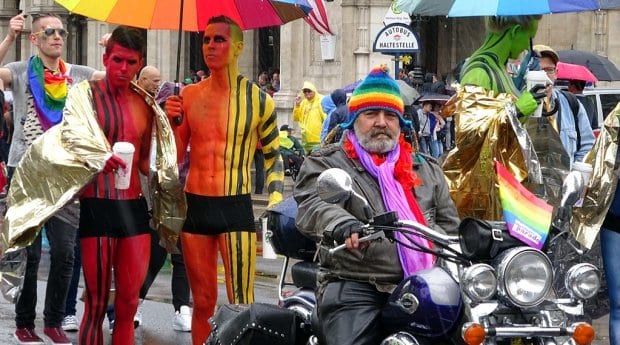
 Why you can trust Xtra
Why you can trust Xtra